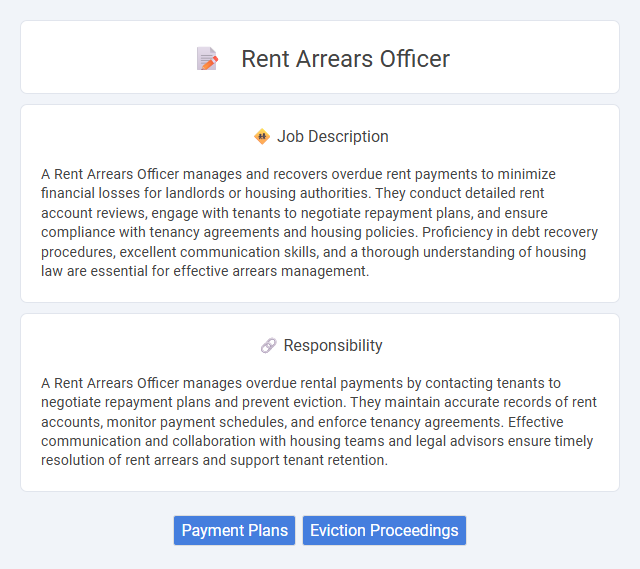
A Rent Arrears Officer manages and recovers overdue rent payments to minimize financial losses for landlords or housing authorities. They conduct detailed rent account reviews, engage with tenants to negotiate repayment plans, and ensure compliance with tenancy agreements and housing policies. Proficiency in debt recovery procedures, excellent communication skills, and a thorough understanding of housing law are essential for effective arrears management.
Individuals with strong communication skills and empathy are likely suitable for a Rent Arrears Officer role, given the necessity to interact sensitively with tenants facing financial difficulties. Those who can remain patient under pressure and demonstrate problem-solving abilities probably handle the demands of negotiating payment plans and resolving disputes effectively. Candidates struggling with high-stress environments or lacking emotional resilience might find this position challenging to perform successfully.
Qualification
A Rent Arrears Officer typically requires a minimum of a high school diploma, though many employers prefer candidates with a background in social work, finance, or housing management. Strong communication and negotiation skills are essential for effectively liaising with tenants and resolving payment issues. Experience in debt recovery, knowledge of housing legislation, and proficiency in relevant computer software enhance job performance and career advancement opportunities.
Responsibility
A Rent Arrears Officer manages overdue rental payments by contacting tenants to negotiate repayment plans and prevent eviction. They maintain accurate records of rent accounts, monitor payment schedules, and enforce tenancy agreements. Effective communication and collaboration with housing teams and legal advisors ensure timely resolution of rent arrears and support tenant retention.
Benefit
Rent arrears officers likely help improve financial stability for landlords and housing organizations by efficiently managing overdue payments. Their role may increase the chances of reducing outstanding debts and minimizing eviction rates. Effective rent recovery practices handled by these officers probably support sustained housing affordability and community wellbeing.
Challenge
Rent arrears officers likely face significant challenges managing the delicate balance between enforcing rent collection and supporting tenants in financial distress. High caseloads and varying tenant circumstances probably increase the complexity of achieving timely payments while maintaining positive landlord-tenant relationships. Navigating legal regulations and negotiation processes may further add to the demanding nature of this role.
Career Advancement
A Rent Arrears Officer role offers significant opportunities for career advancement within housing management and financial recovery sectors. Mastery in debt negotiation, tenant communication, and legal procedures enhances prospects for senior positions such as Housing Manager or Debt Recovery Supervisor. Gaining professional certifications in housing law and financial counseling further accelerates progression in this specialized field.
Key Terms
Payment Plans
A Rent Arrears Officer specializes in managing outstanding rent payments by negotiating structured payment plans tailored to tenants' financial situations. These payment plans help reduce rent arrears effectively while maintaining positive landlord-tenant relationships and ensuring steady income flow. Expertise in monitoring compliance and adjusting plans as necessary optimizes recovery rates and minimizes eviction risks.
Eviction Proceedings
A Rent Arrears Officer manages outstanding rent payments and initiates eviction proceedings to recover owed amounts. They assess tenant payment histories, issue formal notices, and collaborate with legal teams to enforce eviction orders. Expertise in housing law ensures compliance during eviction processes while aiming to minimize financial loss for landlords.
 kuljobs.com
kuljobs.com